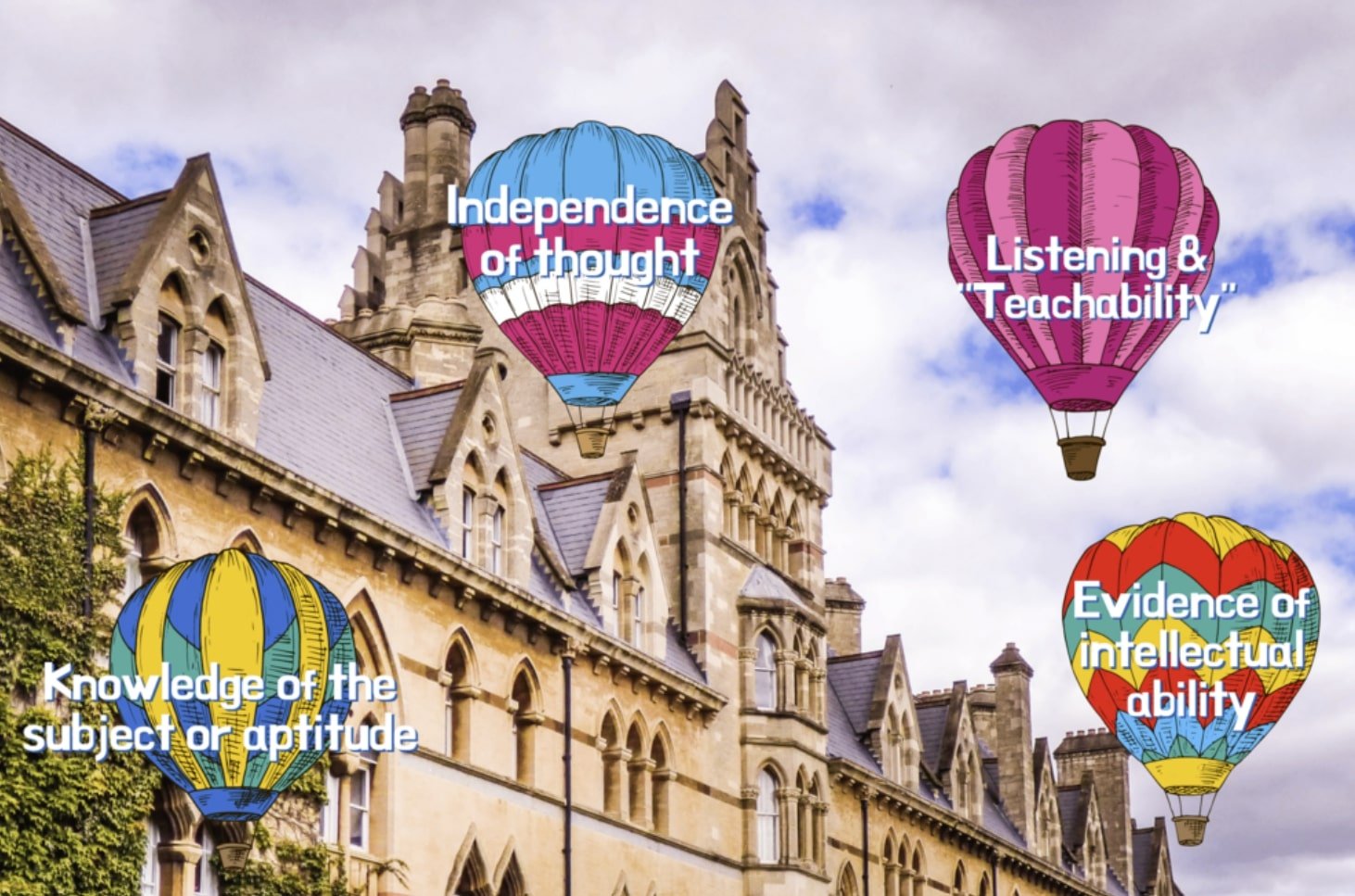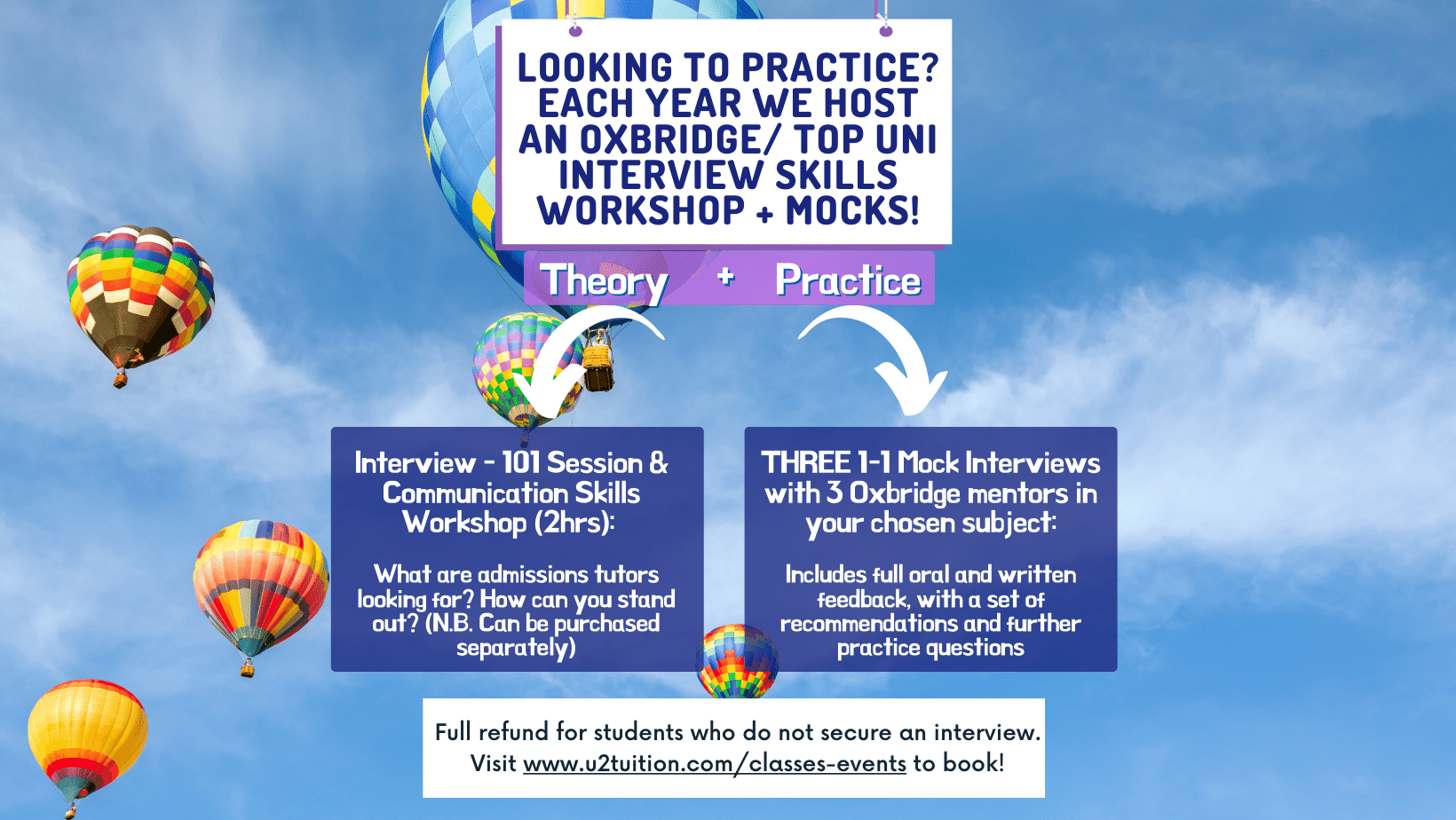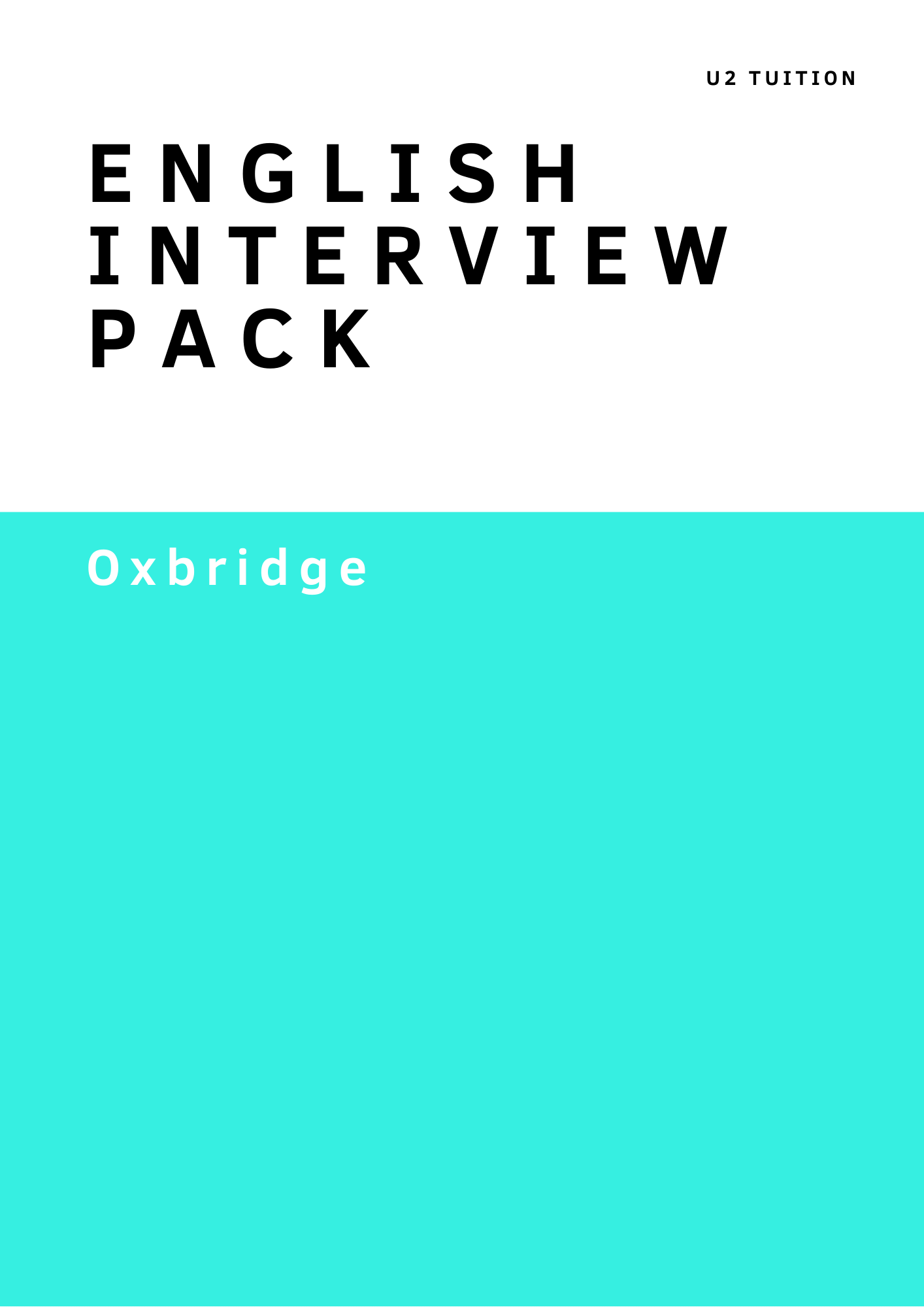How to Ace Your Oxbridge Interview | A 2026 Guide
Oxbridge interview season is upon us, and many of you will be in the midst of preparation. This article aims to give you a thorough run-through of the qualities admissions tutors will be looking out for in stand-out candidates, key formats of question to expect, and some sample interview questions with tips and clues for strong answers. If you are not applying this year, but considering Oxbridge for the future, read through the article to better gauge how to steer your early preparation for top performance when it’s your turn to interview! Do also check out our Oxbridge Interview Preparation page for an insight into how our Oxbridge tutors can support your interview preparation.
Qualities to Demonstrate in an Academic Interview
Oxbridge interviews mirror the general format of the one-to-one or two-to-one Oxford “tutorial” or Cambridge “supervision”. The admissions tutor interviewing you will often be the person that would hold weekly sessions of this type should you secure a place.
You need to demonstrate they will enjoy teaching you in this high-pressured environment. That is why you need to demonstrate your passion, ability to engage, to take on new ideas, your teachability.
Common Oxbridge Interview Question Formats
General Oxbridge Interview Questions
Interviewers tend to ask a couple of background questions purely as an ease in - it is worth preparing answers to these/ thinking how you may structure your response. You don’t want to sound rehearsed, so definitely do not memorise your answer, but having a think beforehand will ensure you come up with an insightful answer. Really think about why you want what / where you’re applying for. Then think deeper. Why is it this specific course you want to study? Why this school or university? Why specifically is it right for you? If you’ve really thought about these things advance, your passion will come across as much more genuine
Why this university?
This is your chance to demonstrate your enthusiasm for the university itself. Ensure you have carried out sufficient research so you are able to tailor your response. You could mention the university’s world-class reputation for outstanding research and teaching if applicable, you could highlight particular university professors or additional activities on offer at the university. This could range from co-curricular to academic related initiatives, such as the Union or one of the university’s research centres. For Oxbridge, you could definitely think about drawing on the university’s unique college system and how you believe this will enhance your student experience.
Other things to mention: Discuss specific modules, practical e.g. fieldwork vs theoretical opportunities, department breakthrough work, choice in paper selection.
Why this course?
This is the most commonly asked “first interview of the day” question. There are likely many reasons as to why you may wish to study the degree - refer to your personal motivations. What sparked your passion? (Don’t mention it stemmed from a young age e.g. age 8, they want to know what motivates you now). Rather than saying you have ‘always’ been interested, try to explain what specifically kick-started your interest. Maybe a particular book, a particular question you had about something, an ‘a-ha!’ moment, etc. This may be a little similar to the introduction you wrote for your personal statement, but try to say something new.
Also make sure you talk about this course specifically. What are your course-specific motivations? A few common examples are as follows:
i. The option to specialise
ii. Ability to learn as part of a diverse, international cohort
iii. The opportunity to write a dissertation in lieu of examination
iv. The teaching style (a mixture of lectures and seminars)
v. The structure of the course/ specific modules (do any modules particularly pique your interest? What is unique about the course?)
When it comes to preparing an answer to this, think long and hard about your motivations and ensure you can justify them. For instance, if you are expressing your interest in a particular module, be sure to demonstrate this through reference to previous practical experience, academic achievement or wider reading/ subject exploration.
Fill a table as in the example for Medicine entrance below to help you direct your Oxbridge interview preparation. Extensively research the university, societies you might want to join etc. N.B. Most universities will have a page dedicated to what they want from applicants - take your cue from them!
Can you tell me about a recent development in your subject?
Stay updated on news related to your subject & advancements in the field - talk about why it interests you - see the Minds Underground article linked in the section below for more of an insight into how to tackle this kind of question.
Personal Statement/ Motivation-based Questions:
Ensure you can extrapolate from your personal statement - to make sure that it is not all you have to offer. Keep a chart of every course-specific activity that you have undertaken e.g. lectures, books, articles, educational podcasts, competitions. You could include:
Key takeaways/ summary
Note down your opinion/ analysis
Pre-empt questions and brainstorm an answer to each - if the lecture, book etc. stimulates a debate, weigh up both sides and note down which side you would come down on
Link endeavours - make connections between topics and concepts
As everyone is aware, Oxford and Cambridge have a hugely competitive application process. You should therefore take this as an opportunity to sell yourself to the admissions team. You need to demonstrate your proven academic ability. You also need to convey your appetite for academic debate/ problem-solving and interest in the study of your subject.
Prepared or Unseen Additional Material:
You may be given some material to look through c.30 minutes before the interview or during it. This is extremely likely for a Humanities/ Social Sciences interview. E.g. A past PPE candidate was given an article on Environmental Economics to read ahead of the interview, which they discussed and critiqued together during. However, it could also apply for STEM interviews - e.g. you could be given a mathematical equation, a graph etc.
Staggered Problem Questions:
These are particularly common at Maths/ Science Oxbridge interviews. They require you to solve several shorter problems before working to a much larger and more sophisticated question. Interviews usually follow a theme, and it is important to remember earlier parts of the interview to reuse in later parts, as usually this is the key to solving the problems. Our main suggestion, therefore, is to ensure you don’t “solve and forget” parts of interview problems.
Open/ Theoretical Questions:
E.g. “What do you think has been the most important development in (…) in the last century?
Read our article on connecting academic concepts & real-world applications on our co-curricular division, Minds Underground, for more of an insight into how to prepare for open/ theoretical Oxbridge questions such as the example given above: https://www.mindsunderground.com/muarticles/real-world-learning-oxbridge-success.
If you’d like further opportunities to practice specific Oxbridge interview questions tailored to the subject you’re applying to, take a look at our subject interview packs. These packs are filled with useful further research suggestions, tips from successful applicants and a bank of further practice questions for you to improve your interview performance. View the full range of packs here.
How to Present Yourself At Your Oxbridge Interview
Check out our blog, “How to Dazzle at Your University Entrance Interview: An Oxford Psychology Graduate and DPhil Psychiatrist's View” for more of an insight into how to present yourself at interview. Interview technique is important to put forward your best self. Even if you are naturally introverted, you can still practise honing:
Confidence
Clarity of speech
Ability to respond under pressure
Body language/ eye contact
We also have a great blog on staying calm and dealing with nerves on the big day: https://www.u2tuition.com/resources/how-to-survive-the-oxbridge-interview-process.
How to Put Your New Oxbridge Interview Skills Intro Practice!
Join our Oxbridge/ Medical School mock interview days! We run two mock interview days each year for students to build confidence ahead of the big day. Each day begins with a group Interview 101 session and a skills workshop (2hrs, 9-11am), followed by mock interviews with our Oxbridge mentors / graduates from the student’s No 1 course of choice.
Looking for support preparing for your Oxbridge interview?
Are you applying to a top UK University/ Oxbridge and keen to put your wider subject knowledge to the test? We offer interview preparation & host Oxbridge mock interview days to build confidence ahead of the real thing:
Visit our University Applications Page on our on-curriculum division, U2 Tuition for full details. Our Oxbridge tutors aim to advance students to the level required for success at interview through regular tutorial sessions and specific admissions preparation (for personal statement, admissions test & interview).
In sessions, students are expected to orally communicate, defend, analyse & critique ideas or solve problems, in conversation with the tutor (an Oxbridge graduate in the student’s course of application), as in an Oxbridge tutorial. This readies students for the challenging entry process and provides them with the tools needed to stand out amongst other strong candidates.
For interview preparation, we offer one-to-one preparation sessions, individual mock interviews and formal Oxbridge Mock Interview Days to offer comprehensive guidance to our applicants.
1-1 Sessions From £75/h + VAT
You may also be interested in our selection of subject-specific interview preparation guides available to purchase on our store. These are filled with useful information about the interview process, including case studies and from successful candidates and banks of further practice interview questions for your subject. View the full range of packs here.






